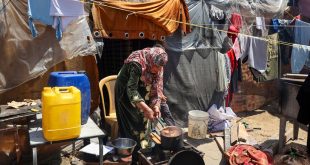Nov 06 (IPS) – COVID-19 has developed into an unprecedented public well being disaster, the influence of which has been seen throughout international well being methods and providers. Because the disaster continues to evolve in India, there’s a want to look at the influence of the pandemic and ensuing nation-wide shutdown on younger individuals’s lives, significantly, their expertise of psychological in poor health well being.
The Dasra Adolescents Collaborative conducted a survey of 111 youth-serving organisations, working with greater than Three,200,000 younger individuals, to raised perceive their views on the experiences of the individuals they serve.
The survey requested organisations about whether or not a number of of the girls and boys they work with had reported health-related issues, challenges in acquiring providers, and the variations within the incidences of those challenges, each earlier than and after the onset of the pandemic. It additionally requested about actions taken, if any, to enhance the scenario.
This text attracts on the findings from the survey, with a give attention to programme implications regarding well being and entry to care through the lockdown.
Psychological in poor health well being
The United Nations has reported a fast international rise in psychological ill-health because the pandemic started. Moreover, research has indicated that extended quarantine intervals can have an enduring adverse influence on psychological well-being and, for adolescents and younger individuals, an elevated danger of Submit Traumatic Stress Dysfunction (PTSD), in addition to anxious and depressive signs. Our examine concurs with these traits:
- Panic and nervousness: Sixty-seven to seventy-four % of surveyed organisations reported that adolescent girls and boys had approached them with emotions of panic and nervousness. Forty-six % of organisations reported that they’d been approached for the primary time through the lockdown by younger individuals experiencing these signs.
- Disappointment and melancholy: Seventy-four % of organisations that labored with women and 67 % of these working with boys reported that younger individuals had skilled unhappiness and melancholy for a chronic interval. Furthermore, 43 % of organisations working with women and 36 % of these working with boys reported that psychological well being issues had solely emerged amongst adolescents through the lockdown interval.
- Suicidal ideation: As many as 5 to 6 % of organisations reported that an incident of suicidal thought or tried suicide had come to their consideration for the primary time through the lockdown. Compared, 2-Three % reported having been approached by a teenager considering or making an attempt suicide each earlier than and through the lockdown interval.
To answer younger individuals’s want for psychological well being counselling, surveyed organisations undertook a wide range of actions:
- Referral to an expert: Seventy-five % ensured that area workers supplied counselling and applicable referrals to younger individuals in want; 48 % referred the younger individual to a psychological well being helpline operated by themselves or a companion; and 26 % referred the younger individual to a different facility. Solely three % of organisations reported that no motion could possibly be taken.
- Prevention and stress administration: Sixty-eight % supported the peer educators/leaders from their group to supply related data to, and conduct actions with, teams of younger individuals. Moreover, 51 % sought to construct the capacities of frontline employees to raised recognise and tackle younger individuals’s issues. Different interventions included making ready and distributing written materials (35 %) or apps (25 %) on stress administration and different psychological well being issues for the younger.
- Different methods: Seven % of organisations adopted different methods, equivalent to establishing a mentoring programme, chatbot, or data centre, making referrals, and elevating consciousness with Panchayati Raj Establishments and group stakeholders. Responding organisations additionally elaborated on the utilization of varied COVID-19-specific toolkits for kids and youth, equivalent to this one, created by UNICEF and ChildLine India.
Entry to well being providers
Massive proportions of responding organisations indicated that younger individuals skilled challenges accessing healthcare through the lockdown:
- Diseases unrelated to COVID-19: Sixty-one % discovered that younger individuals had skilled challenges in accessing healthcare for accidents and diseases unrelated to COVID-19 (89 % of those organisations have been in a position to assist these in have to entry well timed care or attain a facility or a frontline employee).
- Menstrual well being and Iron and Folic Acid (IFA) tablets: Seventy-four % indicated that younger individuals have been unable to entry, or skilled difficulties in accessing sanitary napkins. Moreover, between 35-54 % indicated a scarcity in provides of weekly iron and folic acid dietary supplements (WIFS). A number of of those organisations noticed that such shortages have been skilled by younger individuals for the primary time through the lockdown.
- Contraceptives and pregnancy-related healthcare: Twenty-six to thirty % obtained reviews that younger individuals weren’t in a position to entry contraceptives through the lockdown interval, whereas 52 % reported that pregnant youth had skilled problem in accessing antenatal, supply and/or post-partum care. What’s notable is that many organisations reported that problem acquiring these providers had been skilled solely within the post-lockdown interval and never earlier. Entry to protected abortions was significantly difficult, with 12 % of organisations receiving reviews of problem in acquiring being pregnant termination providers through the lockdown.
Organisations undertook varied actions to fight the above-mentioned challenges.
1. Of the 81 organisations that obtained reviews of restricted entry to sanitary napkins or IFA tablets:
- Forty-two % have been in a position to alert the authorities to supply the provides, and 27 % assisted functionaries in distributing the provides.
- Forty-three % educated youth to hygienically use fabric for menstruation and 40 % sought to acquire and distribute these provides themselves. One responding organisation additionally succeeded in acquiring a free provide of sanitary napkins from the producer for distribution.
- Fourteen % of organisations nonetheless, have been unable to take any motion to assist in acquiring sanitary napkins or IFA tablets.
2. Of these receiving reviews of restricted entry to contraceptives or pregnancy-related providers:
- Forty-nine % alerted the authorities, 30 % assisted healthcare suppliers to distribute contraceptives on the community-level, and 15 % procured contraceptives and distributed them to younger individuals they served.
- Ninety-five % took motion to expedite the supply of maternal and pregnancy-related care and 37 % alerted frontline employees and different healthcare suppliers to take motion.
- Lastly, each organisation that obtained reviews of a woman having problem accessing a protected abortion was in a position to facilitate the supply of applicable providers.
What must be achieved going ahead
As civil society organisations proceed to grapple with this disaster, some key suggestions embody:
- Restore the supply of sexual and reproductive well being (SRH) provides and providers: It’s vital to increase service supply mechanisms for younger individuals, together with figuring out different routes to ship well being providers. This contains permitting well being providers to piggyback on to non-public provide chains, and empowering peer educators to establish younger individuals in want and coordinate entry to provides and providers for them.
- Strengthen present platforms for healthcare provision: Present platforms, equivalent to Rashtriya Kishor Swasthya Karyakram‘s (RKSK) community-based actions and linkages with Adolescent Friendly Health Centres (AFHCs) must be strengthened to be able to make sure that frontline employees are in a position to proceed offering SRH data, make referrals, and distribute provides.
- Create and implement emotional resilience programmes: Because the pandemic evolves, it is going to be vital to make sure that younger individuals have entry to high quality providers for counselling and different instruments for psychosocial assist, in addition to digital peer group and social interactions. The RKSK’s AFHC community and educated counsellors are additionally a key useful resource on this respect.
- Present coaching and capability constructing for professionals: There may be an pressing want to coach healthcare professionals, together with counsellors and frontline employees, in addition to faculty and school lecturers, to make use of expertise to supply providers digitally, and establish early warning indicators for at-risk youth.
- Have interaction and prepare peer educators: Coaching peer educators already engaged beneath schemes equivalent to Ayushman Bharat and the RKSK , in addition to the organisations’ personal networks of youth champions, can play a vital position in figuring out early warning indicators for bodily and psychological well being points amongst their peer teams, and might make referrals to related services or suppliers.
- Make investments sources into digital or telephonic interventions: Growing new instruments and sustaining present accessible sources, equivalent to helplines, tele-medicine sources, ‘Find A Clinic‘ providers, and different related instruments will make sure that younger individuals and their households are in a position to entry providers as required.
- Construct consciousness of and sensitise dad and mom: Coaching and sensitising dad and mom concerning the wants of adolescents is crucial, making certain that they’re able to talk brazenly and non-judgementally, thereby supporting younger individuals to fulfil their sexual and reproductive well being and psychological well being wants.
Insights gathered from this examine point out that younger individuals’s well being has been severely affected by the pandemic and is in want of pressing consideration from all stakeholders. There’s a vital have to act upon these suggestions, making certain that we work in direction of defending and addressing the wants of the younger, to make sure that adolescents and youth throughout the nation meet and reside as much as their full potential.
Sucharita Iyer works at Dasra’s Information Creation and Dissemination workforce.
Shireen Jejeebhoy is Director at Aksha Centre for Fairness and Wellbeing.
Nitya Daryanani is a part of Dasra’s Adolescents Collaborative workforce, the place she drives efforts on thought management by bringing collectively a variety of views round adolescents in India.
This story was originally published by India Growth Assessment (IDR)
© Inter Press Service (2020) — All Rights ReservedOriginal source: Inter Press Service
 Top Naija News: Nigerian News, Breaking News Nigeria and World News Top Naija News is a daily news publication in Nigeria, delivering the latest breaking news in Nigeria and around the world.
Top Naija News: Nigerian News, Breaking News Nigeria and World News Top Naija News is a daily news publication in Nigeria, delivering the latest breaking news in Nigeria and around the world.



